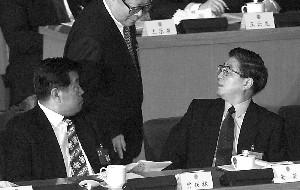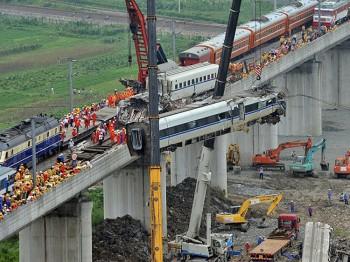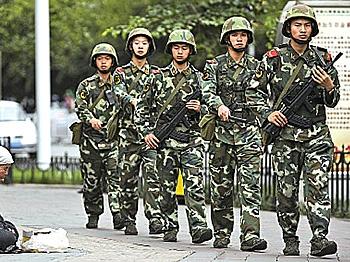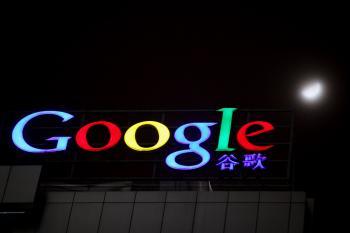China has officially released the news that Huang Ju, vice Premier the State Council of the People’s Republic of China, member of the Standing Committee of Political Bureau died in Beijing at 2:03 a.m. on June 2 at the age of 69. Huang Ju was a key leader of the Shanghai Gang, a power group led by former Chinese president Jiang Zemin.
Unimportant Titles on the Death Note of Huang
Earlier, Britain’s Times reported that Huang Ju passed away on the morning of May 9 at the Beijing 301 Hospital. Hong Kong’s Phoenix Satellite Television, also referred to as Hong Kong’s “ Xinhua News,” had reported Huang’s death in the evening news of May 9. The Phoenix Satellite Television later removed this news and apologized for it. (Xinhua, the official CCP news source, is notorious for publishing propaganda and other-than-factual “news.”)
Analysts of China' affairs think that this piece of news did not come from nowhere. Huang Ju was in critical condition for a while. Due to the intense power struggles within the Chinese Communist Party (CCP), Huang’s death is extremely sensitive, and in the past twenty days, the Shanghai Gang was trying its best to gain “titles” for Huang.
From Huang’s death note published by the CCP’s official media, Xinhua News, China’s present leaders Hu Jintao and Wen Jiabao (Hu and Wen) did not grant fancy “titles” to the No. 6 CCP leader. The death note plainly states the facts of his death, without statements of sorrow and without titles such as “the Great” or “the Revolutionist.” Huang was referred merely as the “an excellent CCP member, a soldier of communism and an outstanding leader.”
A Break to CCP’s Political Balance
Huang Ju was a key leader of the Shanghai Gang. Among the Standing Committee members of Political Bureau, Huang has the closest relationship with Jiang Zemin, former Chinese dictator. Jiang Zemin, Huang Ju and Chen Liangyu, who was removed from position last year, were the “Iron Triangle” of the Shanghai Gang.
Hu and Wen actually declared the complete disintegration of the Shanghai Gang using Huang’s death. Since Hu and Wen started their regime, China’s political situation has been the battle field of two main power groups: one is led by Hu and Wen, composed by the former CCP Youth League leaders, intellectual officials and the former Beijing Gang; the other group is the Shanghai Gang led by Jiang Zemin and some officials who were close to the former Soviet Union. At the beginning of Hu and Wen' regime, they were on the weaker side and their orders could not move beyond their office. But recently Hu and Wen had turned the situation around by promoting the “anti-corruption” campaign.
The Shanghai Gang was already near the brink of collapse. Out of the “Iron Triangle,” Chen Liangyu was dismissed from office, Huang Ju was seriously ill, and Jiang Zemin himself is aged and weak. The death of Huang Ju was the announcement of the retreat of the Shanghai Gang from history; it was the signal of its complete disintegration.
Analysts pointed out that Huang’s death and the Shanghai Gang’s disintegration have broken the CCP’s original political balance. China’s political situation will undergo a short reforming process, possibly a relatively chaotic phase. Faced with the new situation, various cliques will reevaluate and rearrange.
The Beijing Municipal Party Committee Secretary Turned To Show Loyalty to Hu
Take the Beijing Municipal Party Committee Secretary Liu Qi as an example. He used to be the backbone of Jiang’s clique, but this May, he expressed loyalty to Hu in the Beijing Party Meeting. He said that at any time, under any circumstance, he would conscientiously maintain the Central Committee’s authority, and ensure smooth execution of the Central Committee’s orders in Beijing. He did not mention Jiang’s “Three Represents” in his entire statement, which demonstrates that people in Jiang’s clique are surrendering successively. Liu Qi was able to keep his post as the Beijing Municipal Party Committee Secretary. Old troops under Jiang’s clique, including Guangdong Provincial Party Committee Secretary Zhang Dejiang and Shanghai Mayor Han Zheng, share similar situations as Liu.
Jia Qinglin Is the Heaviest-Hearted
At the same time, Huang’s death brought tremendous pressure to another of Jiang’s favorites - Jia Qinglin 1 . Both Huang and Jia were Jiang’s favorites. Many people also saw them as the most notoriously corrupt officials.
Hu and Wen’s obituary notice for Huang was actually giving Jia a warning to back off. If he declines to leave, he might meet with misfortune. It is fair to assume that Jia feels the most heavy-hearted at Huang’s death.
After Jiang’s clique disintegrated, the influence of the “princelings” (the children of the country’s top incumbent, retired or late leaders) will be revealed clearly. Analysts pointed out that the class of princelings generally does not have a unified political interest. They will only have small-scaled local fights over interests. As a whole, it is hard for them to form a new force rivaling Hu and Wen. On the contrary, if Hu and Wen can handle it properly, it is very likely that the profit driven princelings will be willing to be used by Hu and Wen. For example, current Shanghai Municipal Party Committee Secretary Xi Jinping, a representative of the princelings, is controlling Jiang’s base camp for Hu and Wen. It has been reported that Xi took the post after Chen Liangyu’s case. He removed 500 corrupt officials from their Shanghai posts and began wiping out the leftover forces in Jiang’s clique.
Seething Popular Discontent May Erupt Anywhere
After removing the Shanghai Gang’s resistance, Hu and Wen are faced with forced rearrangement before the Seventeenth National Congress of the CCP. Now the biggest challenge facing the CCP’s political situation comes from the populace. With destruction of the ecological environment, the trampling on the human environment and long-term social injustices, seething popular discontent may erupt anywhere. The continued persecution on Falun Gong has amounted to huge political blood debt, who is going to pay for it? All of these will be presented only more clearly in front of Hu and Wen. They become the main issues that Hu and Wen must face directly.
Analysts pointed out that at this time, Hu and Wen can only sort out the relationships and truly master their fate before the convening of the Seventeenth National Congress by following “the will of the Heaven and the people.”
[1] Jia Qinglin (born in March 1940), is one of the key CCP leaders. In 2003, he became the chairman of the Political Consultative Conference, in name the No. 4 leader in the CCP.




